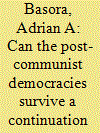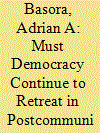| Srl | Item |
| 1 |
ID:
123286


|
|
|
|
|
| Publication |
2013.
|
| Summary/Abstract |
The global financial crisis and its prolonged European aftermath have created a major stress test for democracy in the ten new post-communist members of the European Union. Although a majority of these transitional states have so far withstood the test reasonably well on the economic side, three have lost significant ground on the democracy front. There is also reason for concern that continued Euro-stagnation could lead to additional regression not only in the three countries that have been backsliding but possibly also in others. This could jeopardize the extraordinary progress in post-communist democratization and Western integration achieved with the help of U.S. and EU policy in the 1989-2004 period.
|
|
|
|
|
|
|
|
|
|
|
|
|
|
|
|
| 2 |
ID:
111793


|
|
|
| 3 |
ID:
080755


|
|
|
|
|
| Publication |
2008.
|
| Summary/Abstract |
In late 2004, Ukraine's Orange Revolution appeared to herald a second wave of democratic transformation destined to sweep through much of postcommunist Europe and Eurasia. Now, only three years later, this wave has dissipated. Some analysts see democracy as being in retreat and they view the lessons of 1989-2004 as no longer applicable. This article posits that democratic progress is, in fact, still achievable in many former communist countries, and that a look at recent history provides important perspectives towards that goal. However, both the region's reform leaders and Western policy makers must also take full account of the new "post-postcommunist" paradigm. This paradigm is characterized by Russia's negative and increasing influence, the European Union's "expansion fatigue," the waning of U.S. democracy-promotion efforts and credibility, and some degree of democratic disillusionment. With re-invigorated and more united efforts, the impressive post-1989 gains in democratization can be consolidated and new momentum built towards the goal of "a Europe whole and free."
|
|
|
|
|
|
|
|
|
|
|
|
|
|
|
|